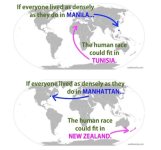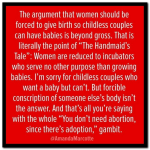Gordy327
DP Veteran
- Joined
- Feb 5, 2022
- Messages
- 22,552
- Reaction score
- 18,597
- Gender
- Undisclosed
- Political Leaning
- Undisclosed
Let me make it clear from the start, I am not "pro-abortion." In other words, I am not advocating women should or must have an abortion. I am pro-choice. The decision to continue a pregnancy or not is strictly and entirely a woman's choice. Neither is it anyone else's decision, business, or concern! But there are those who erroneously equate pro-choice with "pro-abortion," either out of ignorance or probably as a derogatory dig at pro-choice individuals. I have heard arguments made on both sides of the abortion debate. But I have never heard a "pro-abortion" argument. If there are those who are indeed "pro-abortion," they are likely on the fringe and not mainstream or are otherwise silent on the issue. In response to anti-abortionists who want to forcibly take away or severely restrict a woman's right to choose (I have not seen a rational reason why abortion should be restricted before viability), I came up with a "pro-abortion" argument. I have tried to present a general argument (specifics of the argument and its points can be saved for the discussion) based on practical reasoning.
1. You (a woman) have a right to choose. Exercise that right! This is more a matter of personal choice rather than simply telling someone "You should get an abortion." It's not so much a pro-abortion stance as it is a reminder of the individual rights one is free to exercise or not. People have the right to vote and every election, some will say "exercise your right to vote," or "go out and vote," or something to that effect. A woman has the right to choose, and she should also exercise that right. In this context however, the implication is a woman should choose to have an abortion, since she has the right to begin with. With voting, you shouldn't let a vote go to waste. Likewise, with abortion, you shouldn't let an abortion go to waste. But it's really up to the woman.
2. Abortion will reduce economic strain: Let's face it, raising children is expensive and if one is not financially secure enough before having them, they risk becoming or continuing to be impoverished. This causes a lower standard of living and quality of life for both mother and child. If a woman is forced to continue a pregnancy while she has inadequate resources to be self-sufficient, then there is risk of financial, social, emotional, educational, and physical harm to both mother and child. According to the USDA (2015), "a family will spend approximately $12,980 annually per child in a middle-income ($59,200-$107,400), two-child, married-couple family." That's not even counting expenses towards college. This may not be so much an issue for those earning a higher wage, but it is an issue for lower to middle income individuals, where some people live paycheck to paycheck and every penny counts. Factoring in child costs (food, clothing, education, healthcare, ect.) can break the proverbial bank. Economic costs is one factor women might take into consideration when deciding on abortion. Can they afford to have a child? Sometimes, the answer is no.
According to the US Census Bureau, there are over 10 million children living in poverty in this country (365 million in the world). Why add to that number by forcing women to give birth if they do not have adequate means to support children? Poverty can adversely affect the growth, development, health, and wellbeing of a child. Abortions will help reduce that and reduce financial burdens and difficulties. For those that do have a child, they may rely on government assistance, which economically impacts the taxpayers and probably doesn't boost income by a large amount. In effect, a child might grow up poor, and probably in a poor neighborhood with limited means and opportunities. Parental opportunities might also be limited, as time and energy are now used to earn a living wage and pay the bills. Therefore, having an abortion can break one's fall into or cycle of poverty and make life better for them. If a woman chooses to have a child later, then she might be in a stronger economic position at that time to have a better life for herself and the child. By the way, the majority of abortions are from women with limited means.
1. You (a woman) have a right to choose. Exercise that right! This is more a matter of personal choice rather than simply telling someone "You should get an abortion." It's not so much a pro-abortion stance as it is a reminder of the individual rights one is free to exercise or not. People have the right to vote and every election, some will say "exercise your right to vote," or "go out and vote," or something to that effect. A woman has the right to choose, and she should also exercise that right. In this context however, the implication is a woman should choose to have an abortion, since she has the right to begin with. With voting, you shouldn't let a vote go to waste. Likewise, with abortion, you shouldn't let an abortion go to waste. But it's really up to the woman.
2. Abortion will reduce economic strain: Let's face it, raising children is expensive and if one is not financially secure enough before having them, they risk becoming or continuing to be impoverished. This causes a lower standard of living and quality of life for both mother and child. If a woman is forced to continue a pregnancy while she has inadequate resources to be self-sufficient, then there is risk of financial, social, emotional, educational, and physical harm to both mother and child. According to the USDA (2015), "a family will spend approximately $12,980 annually per child in a middle-income ($59,200-$107,400), two-child, married-couple family." That's not even counting expenses towards college. This may not be so much an issue for those earning a higher wage, but it is an issue for lower to middle income individuals, where some people live paycheck to paycheck and every penny counts. Factoring in child costs (food, clothing, education, healthcare, ect.) can break the proverbial bank. Economic costs is one factor women might take into consideration when deciding on abortion. Can they afford to have a child? Sometimes, the answer is no.
According to the US Census Bureau, there are over 10 million children living in poverty in this country (365 million in the world). Why add to that number by forcing women to give birth if they do not have adequate means to support children? Poverty can adversely affect the growth, development, health, and wellbeing of a child. Abortions will help reduce that and reduce financial burdens and difficulties. For those that do have a child, they may rely on government assistance, which economically impacts the taxpayers and probably doesn't boost income by a large amount. In effect, a child might grow up poor, and probably in a poor neighborhood with limited means and opportunities. Parental opportunities might also be limited, as time and energy are now used to earn a living wage and pay the bills. Therefore, having an abortion can break one's fall into or cycle of poverty and make life better for them. If a woman chooses to have a child later, then she might be in a stronger economic position at that time to have a better life for herself and the child. By the way, the majority of abortions are from women with limited means.


